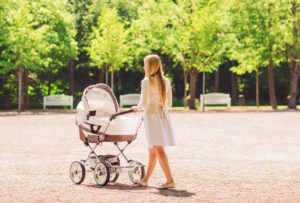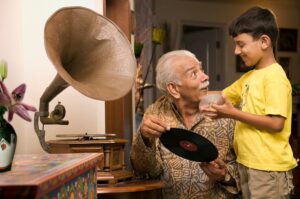Almost everyone collects something. We all have our passions, be it glittery stickers, postcards, old Bravo magazines or coins.
So basically we are all collectors. Under certain circumstances, however, we can go a bit overboard. If the collecting instinct gets out of hand, because in the end you hardly want to part with any object, then the collecting instinct may already have taken on pathological characteristics.
People who collect just about everything and don’t want to throw anything away are also called Messies. This comes from the English word “mess”, which means disorder. And that is exactly what describes the messies very aptly. Because a messy apartment is rarely tidy. Sometimes you can’t even open a door because of the piles of newspapers piled up behind it. If you want to get to the other side of a room, you have to climb over all kinds of boxes.
You see: If you have relatives with a messie syndrome, you suffer with them. Because it is virtually impossible to compensate for the messiness of the messie. Again and again he brings things that he thinks are necessary and important. That this stuff is just lying around and makes a comfortable living impossible, these people do not see.
Especially children who live with messies don’t have it easy. They run the risk of developing a pathological collecting instinct themselves later on.
Table of contents
How Does One Become A Messies?
In most cases, the Messie Syndrome is closely related to other mental illnesses such as schizophrenia or depression. The disease, which is also called littering syndrome, affects an estimated 300,000 people in Germany alone. In Austria, the situation is similar.
Risk groups.
If one has developed a certain collecting passion, which has grown beyond normal collecting, then under certain circumstances a Messie syndrome can develop from it. In most cases, other burdens or acute stress are added to the already existing compulsion to collect. Then one tries to compensate for a loss or one’s own fears by collecting compensate.
To compensate means to try to make up for something. By the way, many messies have a long, difficult history behind them. Some have suffered a lot in their youth and have grown up in difficult circumstances. That’s why they are very afraid of losing something and can’t part with any object.
Spleen or disease?
Not everyone who has a large collection of certain objects standing around at home is automatically a messie. In order to speak of a disease, certain conditions must be met .
-
The collecting mania is considered pathological if the following applies.
-
You can no longer control your own behavior on your own.
-
The condition of littering and collecting mania has existed for a long time. In addition, there has been no improvement for a long time.
-
Well-intentioned tips as well as self-help books and similar first aid measures for psychological problems no longer help. Despite everything, one has the feeling that one must continue to collect.
It may well be that someone simply likes to collect things without suffering from the Messie Syndrome. But as soon as he and his immediate environment begin to suffer from it, the habit becomes intolerable. If, despite outside help, nothing changes in the condition of the apartment, then it could indeed be a case of Messie Syndrome.
However, you can only be completely sure if you have obtained a psychiatric opinion on the matter. Also the discussion with a psychotherapist can give information about whether already pathological features are present or not.
Types Of Messies Syndrome
The course of the Messie Syndrome is not always the same. Depending on the personal conditions, tragic experiences and social circumstances of the person affected, the severity of the disease can vary greatly.
Many messies live alone in their apartment. Their chaos goes unnoticed for a long time. Thus, the disease worsens until they finally get help.
Frequently Represented: Moderately Severe Messies Syndrome
Most of the time, messies do not get to the point of living in a cluttered apartment. Nevertheless, they collect a lot and live in a more or less severe chaos.
Even if in most cases this chaos does not show itself so dramatically on the outside: inside all Messies are very messy. They have the feeling of being out of order. That’s why they withdraw from social life. Once this happens, their relatives also suffer the effects of the disease. They can no longer get a good grip on the person affected and lose contact with him or her. Well-intentioned advice is then met with a lack of interest or even becomes embroiled in a quarrel. If it has come so far, then professional help is needed. Because if the disease remains untreated, it will get worse and worse over time. Very few messies find their way out of their inner and outer chaos and manage to lead a halfway normal life again.
Because the outer chaos is constantly increasing, it puts a lot of stress on the messies. They lose even more control over their environment and the disease gets worse and worse.
Total Clutter
In very rare cases it comes to the fact that one cannot even enter the apartment any more. On television, you usually see exactly these individual cases. In fact, most messies never reach this stage. It is estimated that in about 5% of all messies become a “littering case”.
Help For Messies
Because the Messie Syndrome has a mental illness as its cause, there are also corresponding therapy options.
Measures From The Outside
When a messie is forced to change his life, he reacts with fear and defensiveness. It is therefore of little use to try to surprise the Messie with a clean-up command.
The defense is quite understandable, because the Messie feels the situation as very threatening and it gets to do with the fear, if one interferes into its territory. He can hardly bear the thought that his things will be thrown away.
Therefore, radical measures from the outside are not recommended. Do you know a messie and want to help him? Then first have a conversation with him or her. Because he or she must be willing to get his or her own life back under control. Only then will something be able to change in his or her situation.
The messie must develop the desire to restore order on his own initiative. To do this, he should realize that his living conditions do not correspond to normality. Try to make him aware of this.
Also make it clear to him that he does not have to do it alone. Inform him of his options and offer to help him find a suitable therapist. If you are quite young yourself or feel overwhelmed by this, ask for help from an adult who is in a good relationship with the messie you are trying to help.
On the way to normality through psychotherapy.
Once the desire to do something about their own illness has arisen, messies in principle have a good chance of recovery. They should have psychotherapy prescribed and start looking for a therapist they can confide in. Every psychotherapist specializes in a certain field. He works in this field, uses appropriate methods and tries to help his patient. The following therapy methods can help people with Messie Syndrome get back to normal:
-
Systemic therapy
-
Gestalt therapy
-
Behavioral therapy
Normally, the health insurance company will give you a list of therapists, including their specialty. If the patient does not know what to expect from a particular therapy method, you can simply ask the therapist and have him explain to you exactly how he works.
Please don’t be surprised that therapy is not primarily about cleaning up the mess in the home. The therapist will be more concerned with the underlying problems that you need to get out of the way. After all, if these have not been clarified, even cleaning up the mess won’t help. Of course, you can support the messie if he or she is still strong enough to slowly declutter his or her home.
With the help of therapy, he or she will gradually become so strong that a new accumulation of objects in the apartment can no longer happen so easily.
Supportive measures.
Unfortunately, there are no support groups for messies in most places. Nevertheless, you can talk about it online in special forums. Contact with other messies helps to understand yourself a little better and not feel guilty all the time.
If he or she wants, you can buy some books on the subject of messie. However, this will only bring something if the book is actually read and does not eventually disappear in a pile of old newspapers. The following books are recommended for Messies:
-
„Finally away with the ballast” by S. Felton
-
„The Litter Syndrome” by P. Dettmering and R. Pastenaci
-
„The Messie Handbook” by E. Roth
Worksheet For The Text
1) Explain the difficult words from the text.
What does…
-
Messie
-
Compensate
2) What can you do if someone around you shows signs of Messie Syndrome?
3) How can you develop a pathological obsession with collecting? What leads to it?
Photo: vook / bigstockphoto.com












